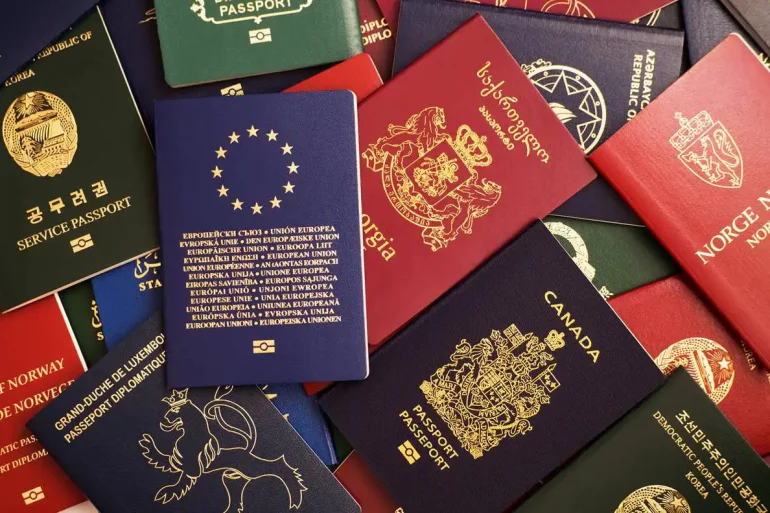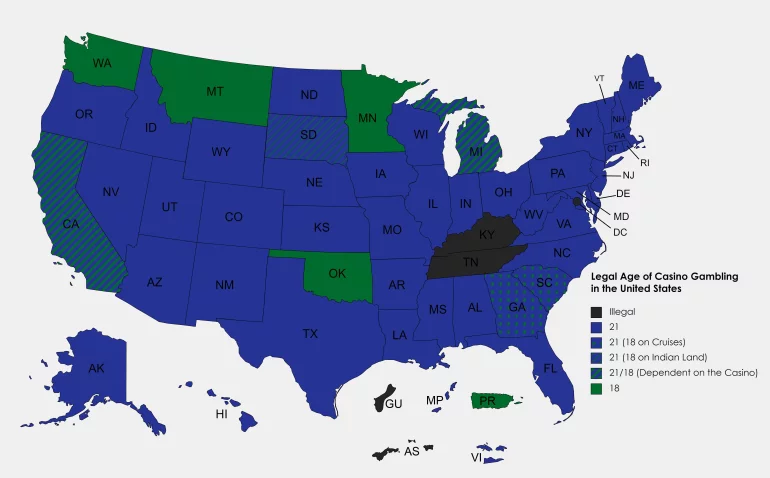
The gambling industry, including its online segment, has experienced explosive growth in recent years. Millions of people worldwide now have access to a wide variety of gambling games and activities from the comfort of their homes. However, enforcing minimum age requirements for customers is a critical aspect of regulating this burgeoning industry.
Age restrictions are a fundamental safeguard aimed at protecting vulnerable populations, especially youth, from the potential harms associated with gambling addiction.
After all, the human brain continues developing well into the mid-20s, making younger individuals more susceptible to the addictive lure of online casinos.
Yet, the specific minimum age limits for casino participation vary significantly from country to country. While some jurisdictions have set the legal gambling age at 21, others allow access starting at 18 or even 19 years old. This patchwork of regulations reflects the differing cultural attitudes, social welfare priorities, and legal frameworks surrounding gambling across the globe.
Navigating this complex aspect is crucial not only for industry operators seeking to ensure compliance but also for policymakers, public health advocates, and gamblers. Understanding the rationale and enforcement of these age limits is a necessary step toward promoting responsible gambling practices worldwide.
This article will delve into the minimal age requirements for land-based and online casino customers in various countries, exploring the key factors driving these policy decisions and the challenges inherent in policing underage gambling in the digital age.
Why Do Casinos Limit the Minimum Age of Customers?
There are a few key reasons why gambling operators impose minimum age restrictions for customers.
Protecting Vulnerable Populations
Gambling addiction and problem gambling can have severe negative impacts, especially on younger individuals whose brains are still developing.
Minimum age limits, typically 18 or 21, depending on the jurisdiction, aim to prevent underage gambling and shield vulnerable youth from the potential harms of gambling.
Regulatory Requirements
Governments and gaming regulatory bodies often mandate minimum age limits for gambling as part of their licensing and regulatory frameworks.
These laws and regulations are intended to promote responsible gambling practices and ensure casinos operate socially responsibly.
Reputational Concerns
Casinos want to avoid the perception of targeting or exploiting minors, which could damage their brand and public reputation.
Upholding strict age verification and access controls helps casinos maintain a responsible image.
Financial Liability
Allowing underage gambling could expose casinos to significant legal and financial liabilities if those individuals develop gambling problems or face other negative consequences.
Adhering to minimum age limits helps casinos mitigate these legal and financial risks.
Social Responsibility
Many casino operators recognize a moral and ethical obligation to protect youth and other vulnerable groups from the potential harms of gambling.
Imposing minimum age restrictions is an essential aspect of corporate social responsibility in the gambling industry.
In summary, the primary reasons for casino age limits are to protect vulnerable populations, comply with regulatory requirements, maintain a responsible public image, manage legal/financial liabilities, and uphold principles of social responsibility.
What Are the Dangers of Gambling for Minors?
There are several significant dangers and risks associated with gambling for underage individuals. Here are some of the key concerns:
- Increased Risk of Problem Gambling and Addiction: Adolescents and young adults have a higher propensity for impulsive and compulsive behaviors, making them more vulnerable to developing gambling addictions. Exposure to gambling at a young age can lead to the early onset of problem gambling, which can have devastating long-term consequences.
- Negative Impact on Brain Development: The human brain continues developing well into the mid-20s, particularly in the areas responsible for decision-making, impulse control, and risk assessment. Gambling can disrupt this critical brain maturation process in minors, potentially leading to lasting cognitive and behavioral impairments.
- Academic and Social Consequences: Gambling can distract minors from their studies, negatively impacting their academic performance and educational outcomes. It can also strain relationships with family and friends and lead to social isolation and withdrawal.
- Financial Harms: Underage gamblers often lack the financial resources and knowledge to manage gambling losses, which can result in debt, theft, and other desperate measures. These financial setbacks can long-term impact a minor's future economic stability and independence.
- Mental Health Issues: Problem gambling in minors is strongly linked to increased rates of depression, anxiety, and other mental health disorders. The stress and shame associated with gambling addiction can exacerbate these psychological challenges.
- Legal and Ethical Concerns: Allowing minors to gamble, whether online or in physical casinos, raises significant legal and ethical issues around the exploitation of vulnerable populations. Underage gambling can expose operators to regulatory penalties and public backlash.
Given these substantial risks, most jurisdictions have implemented strict age restrictions on gambling activities to protect minors and promote responsible gambling practices. Upholding these age limits is crucial for safeguarding the well-being of young people.

Potential Impacts of Age Restrictions
Here are some key possible effects of age restrictions for online casino gambling:
Protecting Vulnerable Populations, Especially Youth
Age restrictions serve as an important safeguard for shielding minors and young adults from the risks of gambling addiction and problem gambling behavior. Younger individuals have still-developing brains, making them more prone to impulsive decisions and compulsive habits that gambling can exacerbate.
Preventing early exposure to gambling through age limits helps protect youth from severe financial, mental health, and psychosocial harms later in life. It upholds ethical obligations not to exploit or cause detriment to vulnerable demographic groups.
Balancing Individual Freedoms with Public Welfare
There is an inherent tension between individual liberty to engage in gambling activities versus broader public health and societal well-being. Age limits reflect a stance that the potential risks of underage gambling require some curtailment of personal freedoms for the greater public good.
Getting this balance “right” is highly subjective based on cultural norms and political ideologies regarding the role of government intervention. Overly restrictive regulations could drive gamblers to unregulated black markets, while lax policies leave youth exposed.
Economic Implications for the Online Casino Industry
Lower minimum ages expand online casinos' potential consumer base and revenue streams. However, underage gambling brings increased regulatory scrutiny, public backlash, and legal liability risks that could outweigh the benefits.
- Jurisdictions with higher age limits may experience market disadvantages compared to regions with more relaxed policies.
- Robust age verification and compliance measures levy administrative and technology costs on casino operators.
- Problem and underage gambling create downstream economic costs that may be passed onto operators through taxation or regulations.
- Ultimately, age restrictions reflect a jurisdiction's philosophy on managing the societal trade-offs between facilitating a gambling economy and mitigating the public health risks—especially for youth and other vulnerable groups.
Navigating this balance has significant impacts on consumer protection and business operating environments. As such, the calibration of online gambling age limits will remain an evolving source of debate and policymaking worldwide.
Gambling Age Restrictions by Country
Here are some key points about gambling age limits in different countries. First, you should remember:
The standard gambling age is 18.
In the vast majority of countries around the world, the legal gambling age is set at 18 years old.
Many nations view 18 as the threshold for adulthood when individuals finish compulsory schooling. While some historical examples contradict 18 as the defined “age of majority,” it is widely accepted for international gambling.
Gambling Age in the United Kingdom
The UK takes a nuanced approach, with different minimum ages for various gambling activities.
The age for most commercial gambling, like casinos and bookmakers, is 18. However, 16-year-olds can legally purchase lottery tickets but are barred from other betting activities until 18.
Gambling Age in the United States
There is no uniform federal gambling age across the U.S., with states able to set their limits.
Most states have the minimum age set at 21, including Nevada (home of Las Vegas). Some states, like Arizona and Maryland, allow gambling at 18 for all activities. Native American reservations can also set their policies, some permitting 18+ gambling.

Gambling Age in China
Most traditional gambling is illegal across mainland China, with only state-run lotteries allowed for those 21 and over. Underground illegal gambling is widespread, with no enforced age restrictions.
The special administrative regions of Macau and Hong Kong have legalized and regulated the casino industry, with a minimum gambling age of 21.
In summary, while 18 emerges as the most common global standard, there are distinctions in how countries legislate and enforce age limits across different gambling sectors and jurisdictions within their borders.
Cultural norms and regulatory philosophies shape these varied approaches to protecting minors from gambling risks.
See the table below for more information about the gambling age in different countries.
| Country | Age | Notes |
| Australia | 18 years | Online casinos and online slots are banned. |
Austria, Albania, Belarus, Bosnia and Herzegovina, Bulgaria, Czech Republic, Finland, Gibraltar, Latvia, Liechtenstein, Lithuania, Luxembourg, Moldova, Monaco, Montenegro, Netherlands, Norway, Poland, Russia, Spain, Slovenia, Slovakia, Switzerland, Serbia, South Africa, and many others. | 18 | |
| Belgium | 18 | 18 is for casinos, and 21 is for the national lottery. |
| Denmark | 18 | Excluding sports betting. |
| France | 18 | Before 1987, it was 21 for casino visitors. |
| Germany | 18 - 21 | It depends on the state and kind of gambling. |
| Greece | 21 | |
| Malta | 18 | It is 25 for citizens of Malta. |
| Croatia | 18 | Except for non-casino slot machines. |
| Turkey | 18 | Only lotteries and horse races are legal. |
| Portugal | 18, 25 | 18 for tourists and 25 for locals. |
| United Kingdom | 16, 18 | It depends on the type of gambling. |
| China | 18 | Only lotteries. |
| USA | 18, 19, 21 or illegal | It depends on the state. |
| Canada | 18, 19 | It depends on the province. |
| South Korea | 19 | |
| Japan | 20 | 18 for pachinko. |
| Thailand | 20 | State lottery only. |
| Macau | 21 | 18 for lottery, sports betting, and racing. |
How Do Gambling Operators Verify the Age of Players?
Casinos use various methods to verify the age of their players, with different approaches for land-based and online clubs.
How Offline Casinos Verify the Age
In traditional brick-and-mortar casinos, age verification is typically done through visual inspection of government-issued identification documents, such as driver's licenses or passports. Casino staff are trained to carefully examine these IDs to ensure they are valid and that the person presenting the ID matches the photograph and information on the document.
Many casinos also implement additional security measures, such as:
- Utilization of card scanners to instantly verify the authenticity of ID cards;
- Mandatory signing of age verification forms by customers;
- Use of wristbands or hand stamps to identify verified, of-age customers;
- Placement of security personnel at entrances to monitor and check IDs.
The physical presence of customers and the ability to directly inspect identification documents make age verification more straightforward in land-based casinos. However, it still requires diligent efforts by casino staff to detect any fraudulent or borrowed IDs.
How Online Casinos Verify the Age
Confirming the gambling age in the online casino environment poses more complex challenges. Gambling websites typically rely on a combination of technological and documentary methods to verify the age of their players:
- ID Document Uploads: Customers are often required to submit digital copies of government-issued IDs, which are then reviewed by the casino's verification team.
- Payment Method Checks: The payment information provided by customers, such as credit card details or e-wallet accounts, may be cross-referenced to confirm the user's age.
- Geo-Location Tracking: Online casinos can use IP addresses and other location data to ensure customers access the platform from jurisdictions where the minimum gambling age is met.
- Database Checks: Some online casinos maintain their own internal databases of verified customer identities, which can be used to confirm age eligibility upon account creation or log in automatically.
- Real-Time Identity Verification: Some online casinos are adopting emerging technologies like biometric identification (e.g., facial recognition and fingerprint scanning) to provide more robust age verification.
Despite these measures, online casinos still face more significant challenges in accurately verifying their customers' ages, as customers could provide falsified information or use someone else's identity. Regulatory bodies and industry best practices continue to evolve to address these concerns and strengthen age verification standards in the digital gambling landscape.
What Are the Risks for Casinos to Allow Underage Gamblers?
Casinos that allow underage gamblers to access their platforms face many significant risks and potential consequences, including:
- Regulatory Penalties and Fines: Gambling regulators worldwide strictly enforce age restrictions and will impose heavy fines or even license revocation on casinos found to be enabling underage gambling. Violations can lead to millions in monetary penalties and severely damage a casino's reputation and ability to operate.
- Lawsuits and Legal Liability: Casinos that knowingly permit minors to gamble may be vulnerable to civil lawsuits, mainly if those underage gamblers later develop gambling addictions or encounter other harms. The legal costs and damages associated with such lawsuits can devastate a casino's finances.
- Reputational Damage: Revelations that a casino is targeting or exploiting underage individuals can quickly erode public trust and tarnish the casino's brand image. This reputational harm can drive away customers, business partners, and investors, severely impacting the casino's long-term viability.
- Ethical and Social Responsibility Concerns: Allowing minors to gamble is widely seen as unethical and socially irresponsible, violating consumer protection principles and corporate social responsibility. This can lead to intense public scrutiny, political pressure, and loss of community goodwill.
- Financing and Insurance Challenges: Insurers and financial institutions may be less inclined to do business with casinos that fail to uphold age restrictions, indicating higher operational and reputational risks. This can make it more difficult and costly for casinos to secure adequate financing, insurance coverage, and banking services.
- Employee and Organizational Risks: Casinos may face internal disciplinary issues, morale problems, and potential legal liabilities if employees are found to be complicit in or enabling underage gambling. There are also operational risks if underage patrons gain access to gambling floors, potentially causing disruptions or safety concerns.
Given these substantial risks, casinos must enforce robust age verification systems and strictly adhere to minimum gambling age requirements to maintain regulatory compliance, protect their reputation, and uphold ethical business practices. Failure to do so can severely affect the casino's long-term viability.
What Is the Actual Situation with Gambling Age Verification?
The current situation with gambling age verification varies across different jurisdictions. Still, there are challenges and shortcomings in the current systems used by many casinos and gaming platforms.
Here are some key points about the real-world status of age verification in the online gambling industry.
Inconsistent Regulations
There are no globally harmonized standards or requirements for verifying the age of online gamblers. Every country/region has its laws dictating the minimum age, verification processes, and regulatory oversight.
This patchwork of regulations creates complexity for international online casinos trying to comply with different rules across their customer base.
Identity Document Vulnerabilities
A primary age verification method requires customers to submit copies of government-issued IDs or other identity documents.
However, these document checks are vulnerable to fraud—scans or photos of fake or borrowed IDs can bypass the system.
Lack of Robust Technology Integration
While technologies like facial recognition, ID authentication databases, and digital identity verification exist, their widespread integration with online gambling platforms is still limited.
Many operators rely on basic document checks rather than advanced, technology-driven age verification.
Limited Third-Party Data Access
Comprehensive age verification would ideally cross-reference customer data against authoritative third-party sources like credit bureaus and government registries.
Access to this external data is often restricted for privacy reasons, hampering casinos' ability to confirm a customer's age fully.
Self-Exclusion Challenges
Online casinos generally have self-exclusion programs to allow customers to ban themselves for gambling addiction issues voluntarily. However, lax age verification enables minors to circumvent these safeguards by creating new accounts.
Uneven Regulatory Enforcement
The degree of scrutiny and penalties for age verification failures varies considerably across jurisdictions.
Some regulators enforce stricter than others in auditing online casinos' processes.
In summary, while age verification protocols exist across the online gambling landscape, consistent technical and process shortcomings allow determined underage individuals to bypass these measures in many instances. Strengthening age verification remains an ongoing challenge and priority for regulators and industry operators.
Conclusion
The online casino industry is booming, with millions of players across the globe now able to access a vast array of gambling games and platforms from their digital devices. However, as this review has highlighted, the specific age limits restricting who can participate in gambling activities vary significantly from one country to the next.
While the United States maintains a federal minimum age of 21 for casino play, many other nations have set the legal age at 18 or 19. The United Kingdom, Germany, and Australia all allow online gambling starting at age 18, for example. This patchwork of age restrictions presents challenges for multinational operators as they must tailor age verification processes to satisfy different regulatory requirements across their customer base.
Beyond the specific age limits, there are also notable differences in how stringently these laws are enforced by government bodies overseeing the online gambling sector. Some jurisdictions take an assertive approach to auditing casinos' age checks, levying heavy fines for violations. Other regions may have comparatively lax oversight and penalties around underage access.
Regardless of the nuances, setting and upholding appropriate minimum age limits is critical for promoting responsible gambling practices and shielding vulnerable populations from the potential harms of gambling addiction. As the cognitive control centers of the human brain continue developing into the mid-20s, allowing underage individuals to participate in online gambling poses severe risks for mental health issues, financial instability, and chronic compulsive behaviors.
Looking ahead, new technologies like biometric identification and integrated identity verification databases may help strengthen age checks for online gambling platforms. However, advancing these safeguards will likely require greater harmonization of regulatory frameworks to establish consistent global standards. Ongoing policy debates around youth protection, gambling ethics, and corporate social responsibility will help shape this rapidly evolving landscape.
While the online casino industry continues its meteoric expansion, maintaining robust age restrictions represents an essential pillar of credible and sustainable operations for the sector. Striking the right balance between individual freedoms and shielding vulnerable groups will remain an ever-present challenge, demanding continued dialogue and concerted efforts from all stakeholders.












